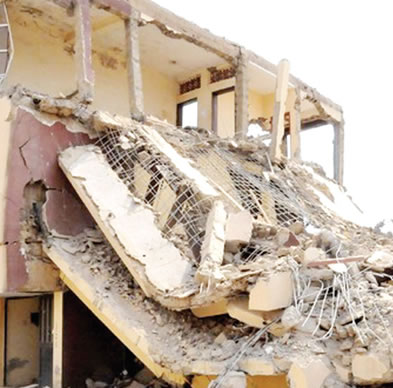
The Building Collapse Prevention Guild has alleged that bottlenecks were deliberately created in the building plan approval process to extort applicants.
The Chairman of the Guild, Lagos Chapter, Joseph Akande, stated this in a statement released on Saturday.
He said, “It was discovered that deliberate bottlenecks were created in the building plan approval process for extortion purposes.
“A centre of corruption is very attractive to most people, who are susceptible to easy and quick illegitimate money making. Experience has revealed that poverty mentality and greed make certain individuals elevate pecuniary gains above risks. How do we explain a situation where a so-called professional endorses/signs the stage certification or conformity form for a building that he/she did not supervise?”
Akande further lamented the corrupt hurdles the guild had passed in recent times.
He narrated, “One day, some BCPG leaders attired in BCPG uniforms decided to pay a visit to two or three building sites in Ebute-Metta. Two of the buildings had no building plan approval and the construction work being carried out by developers was below standard. Rather than make corrections, the developers preferred to offer BCPG members envelopes (monetary gifts), which were politely rejected. The developers were astounded; volunteering that inducement was the standard norm. Information was passed to the appropriate agency for necessary actions that would ensure the right thing was done on these sites.
“This experience was debated at the BCPG meeting of the chairmen of the seven- built environment professional bodies in Lagos State. Such regular meetings enabled the BCPG chairman in the state to give constant feedback or report on BCPG activities to the seven professional bodies’ chairmen. It was resolved at the meeting that BCPG members should avoid site monitoring until modalities of overcoming temptation were developed. BCPG must be protected from corrupt practices. A centre of corruption is very attractive to most people, who are susceptible to easy and quick illegitimate money making.”
Furthermore, the chairman called for caution in the Certified Accreditor Programme introduced by Governor Babajide Sanwo-Olu’s administration.
He said, “The excitement out there is giving an impression that CAP is an invitation to come and eat. Those professionals whose professions are not listed in the programme seem to nurse reservations about being sidelined from potential incentives/benefits/palliatives. Favouritism and marginalisation are being alleged among those whose professions appear in the lower cadre/category on the list. “There is an undercurrent that those who conceived the idea of CAP skewed the programme to favour their profession. This rumour is capable of causing disunity among professionals in the built environment. Professional segregation and unhealthy strife for supremacy. It all portends a struggle for survival without paying due attention to the risk aspect of CAP.
“Over this scramble, past experience now arouses our suspicions that there could be a hidden motive than the incentives to be provided by the government.”
He lamented that inconsistency and intrigues had been the bane of policy formulation and implementation in the Ministry of Physical Planning & Urban Development partly due to frequent changes of commissioners and permanent secretaries.
The General Secretary of Building Collapse Prevention Guild Lagos State Chapter, Mubarak Gbaja-Biamila, said Collective efforts and unalloyed sincerity of purpose would save Lagos State from the crisis of building collapse.
He said, “If developers and homeowners can do rethink and comply with building regulations by engaging the right professionals in building projects, there would be no need for the government to expend humongous resources on on-site monitoring. It is the construction team on a site that should be responsible for project quality delivery, not the monitoring officer(s) who can only visit the site occasionally.
“The role of the monitoring officers is supposed to ensure that the right professionals, who can be held liable, are fully involved in the project delivery process. Hence, the monitoring officers might not need to be too many. Painfully, the attitude of some astute developers, who are bent on maximising profit at the expense of quality, makes intense monitoring and enforcement inevitable.”
According to him, sycophants that surround and shield the boss at the helm of affairs from the reality on the field distort the performance index.





